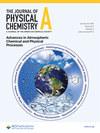Atmospheric Chemistry of 1-Methoxy 2-Propyl Acetate: UV Absorption Cross Sections, Rate Coefficients, and Products of Its Reactions with OH Radicals and Cl Atoms
Abstract
The rate coefficients for the reactions of OH and Cl with 1-methoxy 2-propyl acetate (MPA) in the gas phase were measured using absolute and relative methods. The kinetic study on the OH reaction was conducted in the temperature (263–373) K and pressure (1–760) Torr ranges using the pulsed laser photolysis-laser-induced fluorescence technique, a low pressure fast flow tube reactor-quadrupole mass spectrometer, and an atmospheric simulation chamber/GC-FID. The derived Arrhenius expression is kMPA+OH(T) = (2.01 ± 0.02) × 10–12 exp[(588 ± 123/T)] cm3 molecule–1 s–1. The absolute and relative rate coefficients for the reaction of Cl with MPA were measured at room temperature in the flow reactor and the atmospheric simulation chamber, which led to k(Cl+MPA) = (1.98 ± 0.31) × 10–10 cm3 molecule–1 s–1. GC-FID, GC-MS, and FT-IR techniques were used to investigate the reaction mechanism in the presence of NO. The products formed from the reaction of MPA with OH and their yields were methyl formate (80 ± 7.3%), acetic acid (50 ± 4.8%), and acetic anhydride (22 ± 2.4%), while for Cl reaction, the obtained yields were 60 ± 5.4, 41 ± 3.8, and 11 ± 1.2%, respectively, for the same products. The UV absorption cross section spectrum of MPA was determined in the wavelength range 210–370 nm. The study has shown no photolysis of MPA under atmospheric conditions. The obtained results are used to derive the atmospheric implication.





